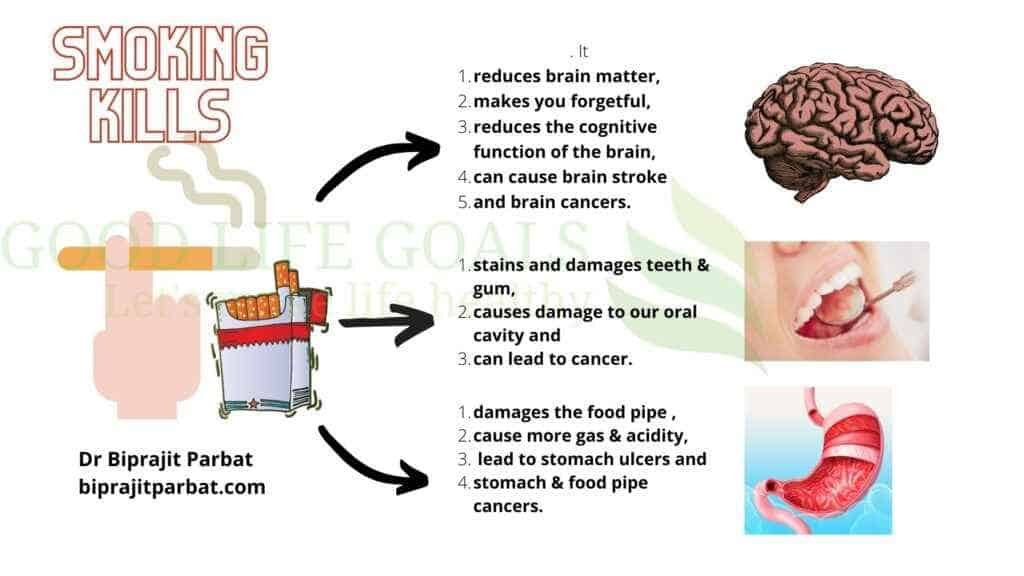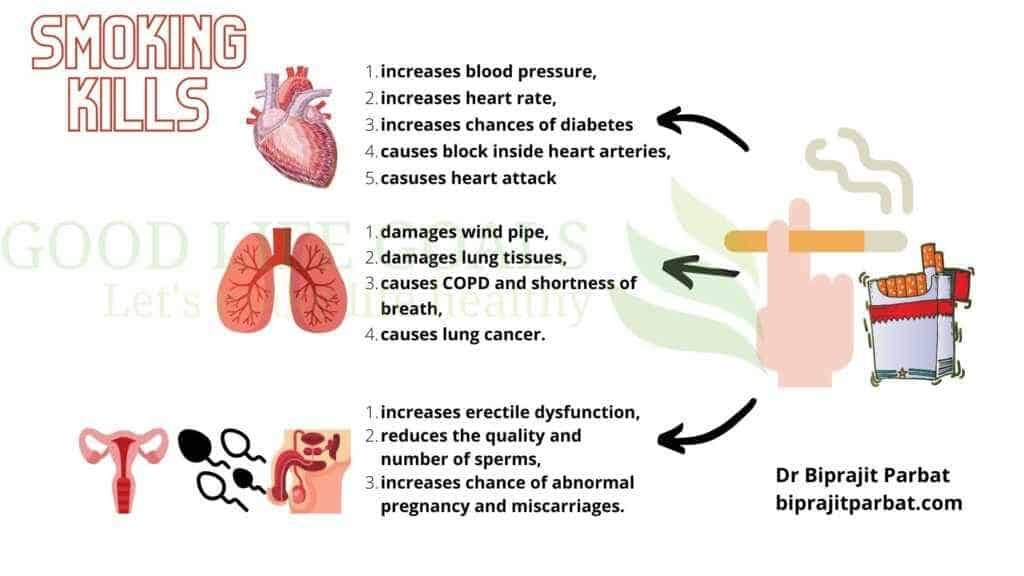We are supposed to breath in air from our mouth and nose and into our lungs. It is supposed to get the fresh air to the lungs and the lungs supposed to deliver the fresh oxygen to the body cells. This oxygen is carried to the body cells by the red blood cells of our body.


12 reasons why smoking is injurious to health –
- This carbon mono oxide damages our red blood cells and reduces its oxygen carrying capacity,
- We deliver carbon monoxide to our lungs which naturally delivers oxygen to our body,
- The free radicals, means half burned and half oxidized enters into our lungs,
- These damages our lungs and starts destroying the air pipes and other lung tissues. This in long term can cause breathing problem (COPD) and cancer.
- These free radicals damage the arteries of the heart and other body parts,
- Each time a person smokes there is momentary rise in blood sugar in the blood – this in long run gives rise to cholesterol issues. Smokers has up to 40% higher chance of having diabetes as smoking reduces the ability of our cells to respond to insulin.
- There is rise of dopamine inside the brain and we feel motivated. But the required dose for the same effect gradually inches up. So is the damaging effects of the smoking.
- Smoking affects your fertility. It increases the chances of erectile dysfunction by two folds. It reduces the sperm counts and sperm movement in the semen.
- Smoking increases the chances of abnormal pregnancy and premature delivery.
- Smoking damages, the food pipe and cause more gas & acidity inside our stomach. It can also lead to stomach ulcers.
- Smoking is bad for oral health. It stains and damages our teeth & gum. It causes damage to our oral cavity and can lead to cancer.
- Smoking damages, the brain. It reduces brain matter. It makes you more forgetful and at a faster rate. It reduces the cognitive function of the brain. Of course, it can cause brain stroke and brain cancers.
However, do you also know that you are likely to suffer from a heart attack through smoking?
You are likely to have heart disease from every cigarette you smoke.
Smoking is related to 2 out of 10 deaths from heart disease.
In the United States, close to 20% of all deaths caused by heart disease are related to smoking cigarettes.
Smoking is even worst for ladies who smoke and swallow pills to control birth. Those who don’t smoke but stay around you as you smoke are also at risk.
Secondhand smoking (means someone else is smoking and you are passively inhaling the smoke) can cause lung cancer and heart disease. Let’s see how secondhand smoking can relate to heart disease.
Relationship between Secondhand Smoking and Heart Disease
Secondhand smoke is smoke exhaled by a smoker’s burning tobacco products. It leads not only to coronary heart disease but also heart attack and stroke.
More than 35,000 early deaths per year from coronary heart disease in the United States of America are caused by secondhand smoke.
Over 8000 deaths from stroke are caused by exposure of nonsmokers to smoke. By 20-30%, nonsmokers are at risk of having a stroke.
The blood, arteries, veins and heart functions are affected by secondhand smoke.
You increase the risk of getting heart disease up to 30% when you inhale smoke from a smoker’s tobacco. This increases your chance of getting heart disease.
How Smoking Leads to Heart Disease?
A substance known as nicotine and the free radical that gets delivered through the smoke cause the following:
- Increases your blood pressure.
- Your heart rate increases.
- The oxygen level your heart gets is reduced.
- The inner parts of your blood vessels are affected. Those of your heart are included.
- Blood clots are more than before leading to both heart attacks and strokes.
- More atherosclerosis (the cholesterol filled damaged cells, that get collected inside the heart arteries) thus more heart attack.
How to Stop Smoking?

You have already seen the dangers of smoking and probably want to stop. Stopping to smoke is not automatic. However, following these guidelines will help:
- Set a date you want to quit smoking.
- Stick to the date.
- Get a journal and write out why you want to stop smoking. What the bad outcomes are that you do not want and what the good outcomes that you welcome into your life by stopping the cigarette smoking.
- Read the reasons every day. Do this before and after you stop smoking.
- Do exercise every day and take plenty of waters.
- Keep a record of why you smoke when you smoke and your activities while smoking. This will help you know what makes you smoke.
- Create and interesting lists of alternative things what you can do rather than smoke. Make up your mind to do another thing when the urge to smoke comes.
- Avoid your smoking partners and where you normally go to smoke. At least you can prepare a list of dialogues and excuses to avoid smoking while partying with them.
- Do mindfulness meditation and declare to yourself that “you are a non-smoker. You hate everything about smoking. You promote healthy living without smoking”. Bring the Dopamine in your brain in other healthy ways. Your brain craves motivation and ways of dopamine.
- Tell your family and friends about your decision to stop and ask them to support you.
- Consult your doctor. He might recommend a medication or give you patches or nicotine gum. Many have been helped with it.
- Look for a smoking cessation program or support group and join.

Benefits of Quitting Smoking –
- Now that you have decided to quit smoking, you will have these benefits:
- The possibility of getting high blood pressure and heart disease will reduce. If you continue not to smoke for 1 to 2 years, the chances of getting heart disease will become less.
- You will have less chance of getting lung cancer, emphysema, and other adverse health conditions.
- You save yourself from the diseases like COPD lung disease with shortness of breath that curse your life with regular usage of inhalers and even going to the bed with the oxygen cylinders for years before you die.
- You can save yourself and your family from the disastrous emotional and economical burden of diabetes, cholesterol, heart attack, cancers etc.
- You will live longer which is the bottom line of quitting smoking.
Conclusion –
Death is inevitable. But how you lived your life that matters. Smoking brings dopamine in your brain – that’s all. It is a form of chemical craving which is not sustainable by from the point of view of our health. Bring the good ways of dopamine. Build the healthy habits. Promote the healthy habits. Stay healthy by yourself and by your family. Spend a healthy and productive life to the end of your days. Avoid smoking.





